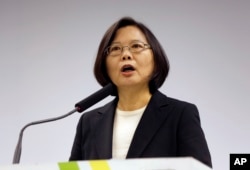Taiwan’s government in-waiting has accepted an invitation to observe the World Health Organization (WHO) annual assembly this year despite a new requirement that the self-ruled island attend as part of its political rival, China.
The government of Tsai Ing-wen, backed by a party that distrusts Beijing, accepted the WHO invitation this week to observe the World Health Assembly May 23-28 in Geneva. The invitation came with the first-time condition that Taiwan comes as part of China, a regular member of the international body.
Tsai disputes the one-China idea and prefers more autonomy for Taiwan.
China claims sovereignty over Taiwan and insists the two sides someday unify, by force if necessary. It periodically uses its global clout to stop international bodies, often U.N. agencies, from recognizing the island as a state. The two sides have been separately ruled since the Chinese civil war of the 1940s.
A need to stay current on world health issues
Tsai’s government, which will take power on May 20, accepted the invitation because it wanted to remain an international player and stay current on global health matters, a spokesman said. The 194-member body’s assembly this month is scheduled to cover strategies for controlling AIDS, viral hepatitis and sexually transmitted infections. But the government in-waiting still rejects one-China.
“Taiwanese people’s health and full rights to participation in the international community absolutely cannot be restricted by any political framework. Therefore we think there is no relation between the one-China basis in the WHO director-general’s invitation and Taiwan’s participation in the WHA,” spokesman Tung Chen-yuan said.
The Nationalist Party government in Taipei set aside political differences with Beijing in 2008 and received its first annual World Health Assembly invitation a year later.
The two sides agreed in 2008 to treat each other as parts of one China but subject to different interpretations – the People’s Republic for Beijing and for Taiwan, its legal name Republic of China. Beijing and the eight-year government of President Ma Ying-jeou say they are observing the 1992 Consensus, named after a meeting between representatives from the two sides that year.
One-China policy
The World Health Organization added the one-China caveat this year because Tsai’s Democratic Progressive Party disputes the premise of one China with differing interpretations, analysts and officials believe.
Tsai won the election in January partly because she advocated more caution in handling China, turning the Nationalists out of power because they felt Ma had grown too close to Beijing. Taiwanese citizens also resent China’s blocking it from international events and organizations.
“President Ma Ying-jeou says that why we smoothly participated in the WHO over the past seven years is because the two sides have the 1992 Consensus,” Premier Chang San-cheng told a May 10 news conference. “The Democratic Progressive Party government says human health rights are a universal value and should be delinked from politics. In principle that’s correct. But to be honest, in actual terms it’s not like that.”








